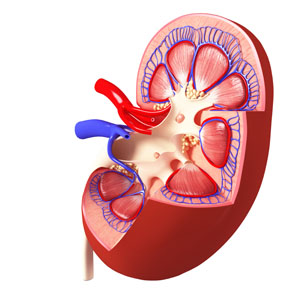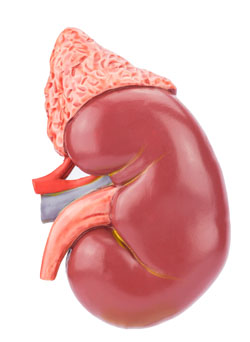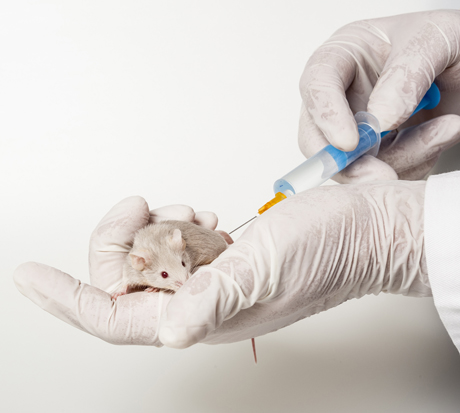Lithium Safely Reduces Mania in Kids 7–17
The first large, randomized, double-blind study of lithium in children and teens has shown that as in adults, the drug can reduce mania with minimal side effects. The study by researcher Robert Findling was published in the journal Pediatrics in October. Lithium is the best available treatment for adults, but until now little research had been done on treatments for children and teens with bipolar disorder.
In the study, 81 participants between the ages of 7 and 17 with a diagnosis of bipolar I disorder and manic or mixed episodes were randomized to receive either lithium or placebo for a period of eight weeks. By the end of the study, those patients taking lithium showed greater reductions in manic symptoms than those taking placebo. Among those taking lithium, 47% scored “much improved” or “very much improved” on a scale of symptom severity, compared to 21% of those taking placebo.
Dosing began at 900mg/day for most participants. (Those weighing less than 65 lbs. were started at 600mg/day.) Dosing could be gradually increased. The mean dose for patients aged 7–11 was 1292mg/day, and for patients aged 12–17 it was 1716mg/day.
Side effects were minimal. There were no significant differences in weight gain between the two groups. Those taking lithium had significantly higher levels of thyrotropin, a peptide that regulates thyroid hormones, than those taking placebo. If thyroid function is affected in people taking lithium, the lithium dosage may be decreased, or patients may be prescribed thyroid hormone.
Lithium Has Minimal Effects On Renal Function: Results Of Two New Large Controlled Studies
 Earlier this year we described a 2015 study by Harald Aiff and colleagues that suggested that long-term lithium use was associated with a risk of kidney failure. That study, published in the Journal of Psychopharmacology, included 630 patients who had taken lithium for at least 10 years. One-third of these patients had evidence of kidney dysfunction, and in 5%, the impairment was severe. Two new studies provide some data that suggest these risks may not be lithium-specific and are comparable to risks that come with taking other medications.
Earlier this year we described a 2015 study by Harald Aiff and colleagues that suggested that long-term lithium use was associated with a risk of kidney failure. That study, published in the Journal of Psychopharmacology, included 630 patients who had taken lithium for at least 10 years. One-third of these patients had evidence of kidney dysfunction, and in 5%, the impairment was severe. Two new studies provide some data that suggest these risks may not be lithium-specific and are comparable to risks that come with taking other medications.
The first, by Stefan Clos et al. in The Lancet Psychiatry, included 1,120 patients followed for up to 12 years. On average, these patients had been exposed to lithium for a little over 4.5 years. Clos and colleagues determined patients’ estimated glomerular filtration rate (eGFR), a measure of how well the blood is filtered by the kidneys. The researchers concluded that there was “no effect of stable lithium maintenance therapy on the rate of change of eGFR over time” compared to other drugs such as quetiapine, olanzapine, or valproate.
The second new study, by Lars Vedel Kessing and colleagues in the journal JAMA Psychiatry, included 26,731 patients exposed to lithium and 420,959 exposed to anticonvulsants. Kessing and colleagues concluded that both exposure to lithium and exposure to an anticonvulsant were associated with an increased rate of chronic kidney disease, but lithium was not associated with end-stage kidney disease (the kind that requires dialysis or renal transplantation).
The three studies taken together suggest the following: Taking lithium for an average of 4–5 years does not affect kidney functioning, and longer exposure may not harm kidney function any more than other medications (such as anticonvulsants) would. However, kidney functioning (in terms of eGFR) does decline with age, and is also lower among those with higher baseline eGRF, those with other illnesses, those taking other drugs that affect the kidneys, and those who experience an episode of lithium toxicity. Read more
Ketamine: Equal Efficacy When Given With Lithium Or Valproate
Studies of rodents with depression-like behaviors revealed that the combination of low (sub-therapeutic) doses of lithium and infusions of ketamine produced antidepressant-like effects. Researchers believed this might mean that in humans, lithium might have a unique effect potentiating the effects of ketamine.
In a small study by Mark J. Niciu presented at the 2015 meeting of the Society for Biological Psychiatry, patients with bipolar depression taking lithium or valproate mood stabilizers were given ketamine infusions or control infusions. In the 23 patients taking lithium and the 13 taking valproate, ketamine’s antidepressant effects were significantly better than placebo, but there was no difference between lithium and valproate with regard to these antidepressant effects. These preliminary data in a small number of subjects do not support the proposition that lithium augments the effects of ketamine in depression.
Lithium May Slow or Prevent Dementia
Lithium inhibits the enzyme glycogen synthase kinase 3, which has been implicated in dementia. To study whether lithium may prevent cognitive decline, researchers led by Tobias Gerhard looked at the medication histories of patients with bipolar disorder who were 50 years of age or older. In their article published in the British Journal of Psychiatry, those patients who had taken lithium 301–365 days out of the previous year had substantially lower risk of dementia than those who had not taken lithium during that time. Patients who had 300 or fewer days of lithium use did not have a significant reduction in dementia risk, nor did patients who were prescribed anticonvulsant drugs.
Editor’s Note: These data are consistent with those of Lars Kessing and colleagues, which suggest that patients in Denmark who renewed their lithium prescriptions were less likely to receive a diagnosis of dementia in old age.
In 2011, Orestes V. Forlenza and colleagues also reported in the British Journal of Psychiatry that compared to placebo, a very small dose of lithium, 150 mg/day, slowed the progression of mild cognitive impairment over one year.
Long-Term Lithium Treatment Has Risks for Kidney Function, Even with Precautions
 Long-term lithium use has long been associated with decreased renal function. But some Swedish researchers noticed that most long-term studies of patients with renal failure had begun in the 1960s and 1970s. In the 1980s, when it became clear that lithium could reduce renal function, doctors began to institute new safety measures for lithium users, including monitoring of blood levels of the drug and of creatinine, a substance that is excreted by the kidneys as part of normal muscle metabolism. So the researchers undertook a new study to examine whether the protocols instituted in the 1980s had reduced the renal risks of long-term lithium use. Unfortunately, they found that some reduced renal function is still common among people who use lithium for longer than 10 years, and this risk does not necessarily decrease when patients stop taking lithium.
Long-term lithium use has long been associated with decreased renal function. But some Swedish researchers noticed that most long-term studies of patients with renal failure had begun in the 1960s and 1970s. In the 1980s, when it became clear that lithium could reduce renal function, doctors began to institute new safety measures for lithium users, including monitoring of blood levels of the drug and of creatinine, a substance that is excreted by the kidneys as part of normal muscle metabolism. So the researchers undertook a new study to examine whether the protocols instituted in the 1980s had reduced the renal risks of long-term lithium use. Unfortunately, they found that some reduced renal function is still common among people who use lithium for longer than 10 years, and this risk does not necessarily decrease when patients stop taking lithium.
The researchers, led by Harald Aiff, published the study in the Journal of Psychopharmacology in 2015. They identified 4,879 patients who had been prescribed lithium, and narrowed this list down to 630 adult patients who had taken lithium for at least 10 cumulative years, who had normal levels of creatinine when they began taking lithium, and on whom good data existed. About one-third of these patients had evidence of chronic renal impairment, and in 5% of these the impairment was severe or very severe.
Aiff and colleagues’ findings show that lithium treatment requires careful monitoring, especially over the long term. Patients must consider the risk/benefit ratio of lithium treatment. Since prevention of mood episodes can preserve an average ten years of life expectancy, and lithium has the best data for efficacy in preventing manic and depressive episodes, patients must weigh the risks of insufficiently treated bipolar illness against the possibility for long-term decreases in kidney function.
Trace Amounts of Lithium in Drinking Water Associated with Lower Suicide Rates in Men
Studies in Japan, Austria, and Texas have reported that trace amounts of lithium in drinking water are associated with lower suicide rates. A new study seeks to clarify these findings by removing any statistical factors other than lithium levels that could produce these results.
The study, published in the Journal of Clinical Psychiatry, collected 434 lithium samples in drinking water over three years, and compared these with suicide rates in the population of 274 municipalities of Kyushi Island in Japan.
The researchers, led by Nobuyoshi Ishii, then controlled for size of population, proportion of elderly people, proportion of one-person households, proportion of people with a college education or more, proportion of people engaging in primary industry, overall unemployment rates, annual marriage rates, annual mean temperature, and annual savings in per person in Japan’s popular postal bank. In places with slightly higher trace levels of lithium in drinking water, there was a lower rate of suicides in men. Suicide rates for women and overall were not significantly associated with lithium levels.
Short Telomeres in a Rat Model of Depression, Lithium Reverses Abnormality
Telomeres are repeated DNA sequences that sit at the end of chromosomes and protect them during cell replication. Telomeres get shorter with aging and with stressors or psychiatric illnesses. Researcher Alexandre Mathe and colleagues recently found that in a line of rats bred to be more susceptible to stress and depression-like behavior, hippocampal telomeres were shorter than in normal rats or rats bred to be less susceptible. The susceptible rats also had lower levels of enzymes that maintain telomere length. Both telomerase activity and Tert (telomerase reverse transcriptase) expression were reduced in the susceptible rat compared to the other rats. However, lithium reversed the low levels of telomerase activity and Tert expression.
Editor’s Note: Lithium increases hippocampal volume in people, and also increases human telomerase. Researcher Lina Martinsson reported in 2013 that lithium increases telomere length in white cells. Now lithium has increased hippocampal telomerase in a rat model of depression. Short telomeres are associated with aging and increased vulnerability to a wide range of medical and psychiatric disorders. Since people with bipolar disorder are prone to memory problems, medical problems, and short telomeres, they might want to talk to their physician about including lithium in their treatment regimen, if they are not already taking it.
Lithium Extends Anti-Depressant Effects of Ketamine in Mice
While it can sometimes take weeks for the effects of antidepressant treatments to appear, intravenous ketamine can produce antidepressant effects in as little as two hours. However, ketamine’s effects fade after three to five days. New animal research by Chi-Tso Chiu et al. explores whether adding lithium to ketamine treatment can produce more sustained antidepressant effects.
Mice who are restrained by being placed in a tube for several hours (chronic restraint stress) exhibit a behavioral and neurochemical profile that resembles human depression. When Chiu and colleagues pretreated these stressed mice with sub-therapeutic doses of lithium (600 mg/L) in their drinking water for several weeks, a sub-therapeutic dose of ketamine (2.5 mg/kg of body weight) was enough to produce robust antidepressant effects in the mice, while neither drug alone was effective at these doses.
The combination of ketamine and lithium also restored the density of spines on the dendrites of neurons in the medial prefrontal cortex. Post-treatment with lithium (1200 mg/L) for several weeks was also successful in extending the effects of a single (50 mg/kg) ketamine injection.
Both lithium and ketamine affect the intracellular signaling pathway mTOR. Ketamine activates the pathway, increasing levels of synaptic proteins and dendritic spine density. It also increases brain-derived neurotrophic factor (BDNF) and the BDNF receptor TrkB. BDNF is important for learning and memory.
When lithium was added to the treatment of the mice with ketamine, the mTOR and BNDF pathways were further activated. Lithium also inhibits the receptor GSK-3, supporting ketamine’s rapid-acting antidepressant effects.
Ketamine treatment can produce oxidative stress, in which toxic free radicals can endanger cells, and the addition of low doses of lithium also completely prevented this neurochemical side effect.
Chiu and colleagues hope that the findings of this study in mice can eventually be applied to research in humans in the hopes of finding a clinical option that would sustain the rapid-onset antidepressant effects of ketamine for the long term.
More Evidence That Lithium Prevents Mania and Depressions
There is a large body of research showing that lithium is better than placebo and a variety of comparison drugs at preventing manic episodes in people with bipolar disorder. It has been less clear whether lithium is as effective in preventing depressions in bipolar patients. In a 2014 meta-analysis in the International Journal of Bipolar Disorders, Emanuel Severus and colleagues confirmed that lithium was more effective than placebo at preventing mood episodes overall and manic episodes. In a fixed effect statistical analysis, lithium was also better at preventing depressive episodes.
The portion of the meta-analysis comparing lithium to placebo included seven randomized controlled trials that included a total of 1,580 patients. Lithium was more likely than placebo to lead to patients dropping out of a study for reasons other than a mood episode, but patients who received lithium were more likely to complete their clinical trials.
Another part of the meta-analysis compared lithium to anticonvulsant drugs. Seven trials were included totaling 1,305 patients. Lithium was better than anticonvulsants at preventing manic episodes, but equally effective at preventing mood episodes overall and depressive episodes specifically. There was also no difference in patients dropping out of the trials or completing the trials.
The researchers concluded that lithium remains the most valuable treatment option for bipolar disorder, because no other drug has such consistent efficacy in preventing manias and depressions and mood episodes in general.
Lithium Effective In Adolescent Mania And Increases White Matter Volume
At the 2014 meeting of the American Academy of Child and Adolescent Psychiatry, researcher Adelaine Robb reported that in 81 children with mania (aged 7-17), lithium was superior to placebo in reducing the severity of mania measured on the Young Mania Rating Scale. There had been some debate about the efficacy of lithium in young children with mania, but this study clearly indicates lithium’s effectiveness. The drug is approved by the Federal Drug Administration (FDA) for use in patients with bipolar disorder aged 12 and up.
Another researcher, Vivian Kafrantaris, found that in children who averaged 14.5 years of age, lithium increased the volume of the corpus callosum, a bundle of neural fibers that connects the brain’s right and left hemispheres. Lithium also normalized white matter integrity in other neural fiber tracts—the cingulum bundle and the superior longitudinal fasciculus. The authors concluded that lithium may “facilitate microstructural remodeling of white matter tracts involved in emotional regulation.”
Editor’s Note: There is much research showing that in adults, lithium has positive effects on the brain, including increases in hippocampal and cortical grey matter volume. Now it appears that lithium can improve white matter integrity in the developing brain as well.









